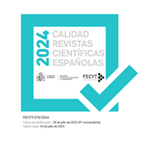Reformulation Markers in Spanish and Korean: An Intercultural Rhetorical Study
Resumen
El objetivo de este artículo es investigar el uso de los marcadores de reformulación en español y en coreano a la luz de las características retóricas interculturales / contrastivas (Kaplan, 1966; Hinds, 1987; Clyne, 1994; Connor, 2008, 2011). Para llevar a cabo este análisis, siguiendo una línea de trabajos de investigación previos en Murillo (2007, 2012), se realizó un estudio empírico utilizando un corpus periodístico en español y en coreano. Los resultados obtenidos de nuestra investigación demuestran una disparidad significativa entre el uso de los RM en español y coreano al abordarse desde la perspectiva de la retórica lingüístico-intercultural, más concretamente en cuanto al uso de la doble reformulación -la repetición de los marcadores coreanos (jeuk… jeuk… / got… got…)-, algunos patrones retóricos del marcador coreano got, que denotan su idiosincrasia cultural, y los procesos discursivos como ‘definición’, ‘denominación’ y ‘conclusión’ a través de los marcadores seleccionados en estos dos idiomas.
Descargas
Descarga artículo
Licencia
La revista Círculo de Lingüística Aplicada a la Comunicación, para fomentar el intercambio global del conocimiento, facilita el acceso sin restricciones a sus contenidos desde el momento de su publicación en la presente edición electrónica, y por eso es una revista de acceso abierto. Los originales publicados en esta revista son propiedad de la Universidad Complutense de Madrid y es obligatorio citar su procedencia en cualquier reproducción total o parcial. Todos los contenidos se distribuyen bajo una licencia de uso y distribución Creative Commons Reconocimiento 4.0 (CC BY 4.0). Esta circunstancia ha de hacerse constar expresamente de esta forma cuando sea necesario. Puede consultar la versión informativa y el texto legal de la licencia.











